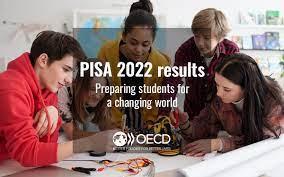
https://www.oecd.org/newsroom/decline-in-educational-performance-only-pa...
PISA 2022 tested nearly 700,000 15-year-old students in 81 OECD Member countries and partner economies on mathematics, reading and science. This edition, with a focus on maths, was also the first to collect data on student performance, well-being and equity before and after the COVID-19 pandemic.
Overall, on average, the PISA 2022 assessment saw an unprecedented drop in performance across the OECD. Compared to 2018, mean performance fell by 10 score points in reading and by almost 15 score points in maths.
The sharp decline in maths performance is three times greater than any previous consecutive change, and particularly significant in countries such as Germany, Iceland, the Netherlands*, Norway and Poland, which all saw a drop of 25 score points or more in maths between 2018 and 2022.
The decline in performance can only partially be attributed to the COVID-19 pandemic, with falling scores in reading science and maths already apparent prior to 2018.
“Since its launch in 2000, PISA has proven an effective catalyst for reform to boost the quality and impact of education systems around the world. It is a powerful tool that policymakers can use to ensure their education systems are as effective as they can be. Education and skills are fundamental to ensuring young people have the best possible opportunities to develop, to adapt to a rapidly changing world, to contribute, to participate, to get ahead and yes to benefit from the opportunities in front of them in our economies and societies,” OECD Secretary-General Mathias Cormann said launching the report in Paris. “PISA 2022 helps to identify the comparative strengths of education systems that have performed well despite recent shocks. This enables policymakers across the 81 participating countries and economies to rely on these insights, adapting them to their particular circumstances as required and pursue reforms to education systems for a brighter, more prosperous future.”
On the upside, many countries, including Cambodia, Colombia, Costa Rica, Indonesia, Morocco, Paraguay and Romania, have rapidly expanded access to education over the past decade, for example, making significant progress towards universal secondary education.
In maths, Singapore and five other East Asian education systems, Macao (China), Chinese Taipei, Hong Kong (China)*, Japan and Korea, outperformed everyone else. These same countries and economies were the next highest performers in science, along with Estonia and Canada*. In reading, Ireland* performed as well as Japan, Korea, Chinese Taipei and Estonia.
A further ten countries and economies saw both a large share of all 15-year-olds gain at least basic proficiency in maths, reading and science, and high levels of socio-economic fairness in terms of outcomes: Canada, Denmark, Finland, Hong Kong (China), Ireland, Japan, Korea, Latvia, Macao (China) and the United Kingdom. While socio-economic status remains a significant predictor of performance, education in these countries and economies can be considered more equitable than others.
Analysing the impact of the COVID-19 pandemic, around half of the students across the OECD experienced closures for more than three months. But the results show no clear difference in performance trends between education systems with limited school closures such as Iceland, Sweden and Chinese Taipei and systems that experienced longer lasting school closures, such as Brazil, Ireland* and Jamaica*.
The study also finds that the availability of teachers to help students in need had the strongest relationship to maths performance across the OECD. Maths scores were 15 points higher on average in places where students agreed they had good access to teachers’ support. These students were also more confident than their peers to learn autonomously and remotely. Despite this, only one in five students overall reported having received extra help from teachers in some lessons in 2022. Around eight percent never or almost never received additional support.
The survey also reveals the fast-changing impact of technology on children’s educational performance. PISA shows that moderate use of digital devices in school is associated with higher performance, but this depends on the technology being used to support rather than distract from learning.
On average across OECD countries, students who spent up to one hour a day on digital devices for leisure scored 49 points higher in maths than students who spent between five and seven hours per day, after taking into account students’ and schools’ socio-economic profile.
45% of students reported feeling nervous or anxious if their phones were not near them, on average across OECD countries, and 65% reported being distracted by using digital devices in at least some maths lessons. The proportion topped 80% in Argentina, Brazil, Canada*, Chile, Finland, Latvia*, Mongolia, New Zealand* and Uruguay.
Students who reported being distracted by other students using digital devices in some, most or every maths class scored 15 points lower in PISA maths tests than those who barely experienced this. This represents the equivalent of three-quarters of a year’s worth of education, even after accounting for students’ and schools’ socio-economic profile.
The report, together with country analysis, summaries and data, is available at www.oecd.org/pisa.
Note to editors - The use of an asterisk (*) next to the name of a country or economy indicates issues with meeting PISA’s technical standards on sampling.
For more information, journalists should contact the OECD Media Office (tel. + 33 1 45 24 97 00).
Working with over 100 countries, the OECD is a global policy forum that promotes policies to preserve individual liberty and improve the economic and social well-being of people around the world.









